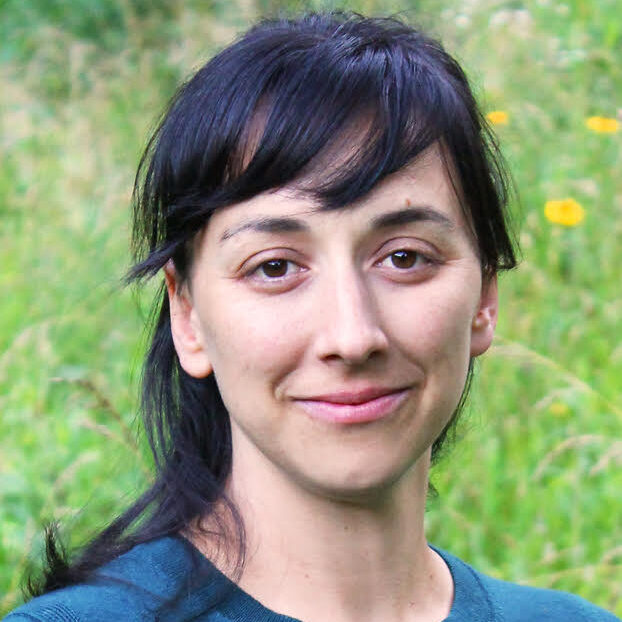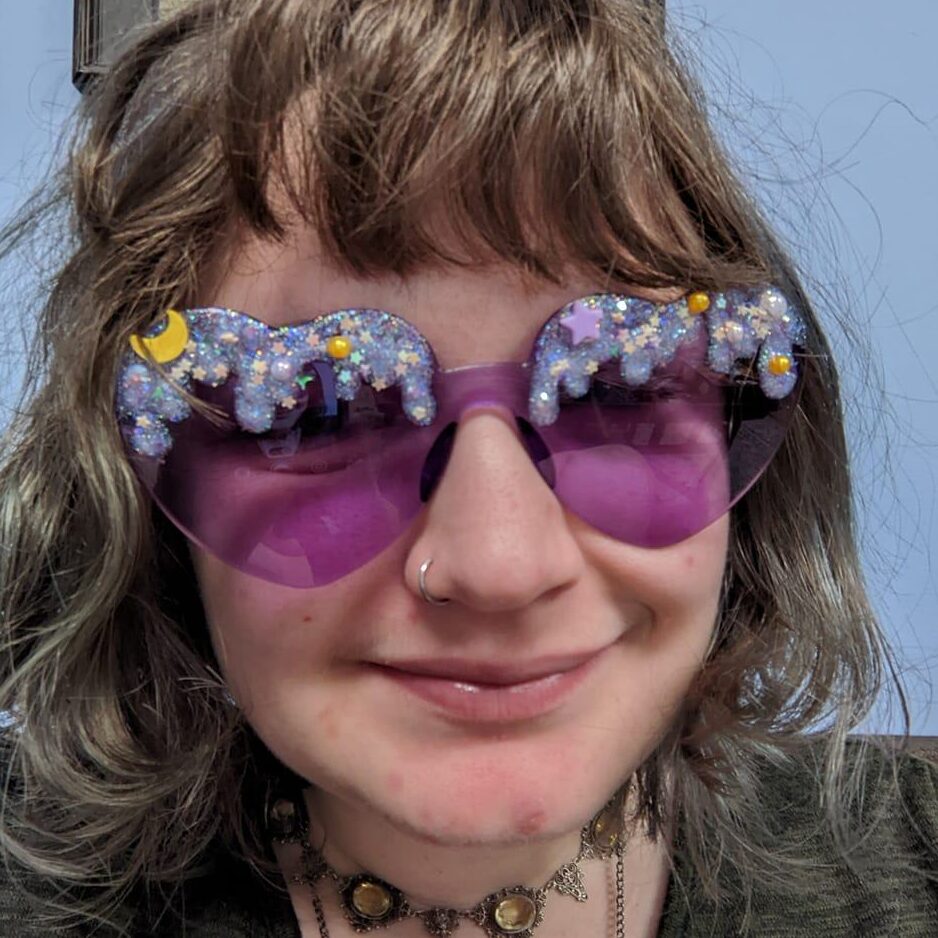Sixteen-year-old Rumi Sabzwari has spent his entire life behind the armored walls of St. Iago, which protect citizens of the Union of Upper Cities from the outside world’s environmental devastation. When rebels infect his father with a fatal virus, Rumi escapes St. Iago, desperate to find a cure.
In the ruined city of Paraíso, Rumi meets fifteen-year-old Paz, who agrees to guide him on his journey. As they travel together, Rumi finds himself drawn to Paz — and behind her tough exterior, she begins to feel the same way. But Paz knows more about Rumi’s father’s illness than she’s saying and has her own agenda. With the powerful forces at play in their cities putting them at odds, can the two learn to trust in each other — enough to imagine a different world?
We spoke with Lauren Yero, author of Under This Forgetful Sky, about dystopian literature, environmental racism, and limb difference representation.
This interview has been edited and condensed for clarity.
Questions
First of all, what attracted you to dystopian literature?
I’ve always loved books that play with double vision — where the world of the novel overlays the world of the reader’s experience in dynamic and sometimes disturbing ways. Speculative literature, broadly speaking, is so good at this act of double vision, and I find dystopian fiction to be especially provocative; it casts such a harsh light on our world, and I love that. In really good dystopian literature, this harsh light exposes something undeniably true about the world, but something that’s hard to see in the familiar context of day-to-day life. A good dystopia makes visible what was previously unseen, or at least what was conveniently ignored, in the real world.
I think this is partly why young people gravitate toward dystopias in literature. As a young person, you’re constantly evaluating the world around you, figuring out what you think about this or that with an unsentimental gaze. When a book identifies the hypocrisies or injustices that you yourself have observed in the world around you, it can make you feel seen—and potentially less alone.
Or — perhaps I should speak for myself here: this is how I felt as a young adult reading dystopian literature. And it’s a big part of why I chose to write in that space.
One of your protagonists, Paz, has a limb difference. When writing that aspect of Paz, what kind of research did you do to make sure your portrayal was authentic to the community?
It might be helpful to offer a window into the worldbuilding of the novel to answer this one, because Paz’s limb difference is so completely bound up in the novel’s larger structures of power. In the book, there’s a stark divide between “Upper City,” a network of cities across the world that have walled themselves off from the environmental and sociopolitical dangers outside, and “Lower City,” which is how Upper City refers to everything outside its walls. Upper City routinely uses violence to extract resources from the Lower City world, leaving a poisoned landscape in its wake. This is the origin of Paz’s limb difference, which she is born with: her mother is exposed to extremely dangerous environmental toxins while Paz is in utero.
One question I grappled with as I wrote Under This Forgetful Sky was: what do we owe to one another in this increasingly interconnected world? The question is an echo of the John Muir quote — that when we try to “pick out anything by itself, we find it hitched to everything else in the universe” — but I wanted to get at something more explicitly political, rooted in the idea that we all live downstream or upstream from someone, that our bodies are not distinct from the rest of the world, that violence lives on intergenerationally, both in the land and in the physical bodies of those who make the land their home. So, the research I did in writing Paz’s character was partly theoretical, with books like Stacy Alaimo’s Bodily Natures and Rob Nixon’s Slow Violence and the Environmentalism of the Poor that grapple with the interpenetration of body and environment. This kind of research felt critical to understanding Paz’s internal landscape, especially in terms of the stories she tells herself and has been told about her body’s abilities and limitations.
But I also want to speak to your question more personally. I’ve lived with a hypermobility disorder since childhood, and I drew on my own experience in some respects while writing Paz’s character — that is to say, I didn’t write my experience in writing Paz’s story, but my own experience couldn’t help but inform the writing. The anger and frustration and exhaustion and fear that I experienced as a young adult surrounding my own diagnoses — and the misplaced, internalized shame that grew within these realities — gave me a window into Paz’s emotional landscape. It also influenced my decision to give Paz the badass confidence and pluck that I wish I’d had growing up in a body that experienced the world differently from many around me.
That said, my own experience is wildly different from Paz’s. Together with my publishing team, we brought on several sensitivity readers for this novel, including a reader whose experience—both personally and professionally within the community — helped me identify blind spots in my language, specifically in the ways that Paz thinks and speaks of her own limb difference. The hope here was to create a story that was not just inclusive but actively anti-ableist. This reader’s contributions run throughout the novel, and I’m so grateful to her for her insights.
Under This Forgetful Sky deals with environmental racism, showing how environmental trauma is a pillar of inequality. Of course, this reflects truths in our real world, but were there any specific events that inspired your work?
I don’t know that any single event inspired the novel, but shortly before I started writing it in earnest, the Deepwater Horizon offshore drilling rig exploded. Sometime after the explosion, BP installed this underwater camera that showed live footage of oil pouring into the Gulf of Mexico, and I remember watching the footage, frozen and horrified, during the months — literal months — that it took to cap the well. I think that was the first time I felt real environmental dread. And I remember thinking: this thing is coming for all of us. But some of us have the privilege to look away, for now.
I now live in a community in western North Carolina that was devastated by Hurricane Helene, where we quite literally found ourselves downstream from a frightening cocktail of chemical contaminants in the aftermath of the storm, and where so many people lost their homes and businesses and jobs and lives. And that same feeling of dread came over me, this time watching from inside the long emergency. What surprised me, though, is that there’s beauty as well as heartbreak, being inside of it. Many people watch an initial disaster unfold with shock and horror, and then they move on. They assume it’s over. But not everyone. Some people refuse to look away. I’ve seen so many neighbors and friends and complete strangers find their own superpowers amid this disaster, and that’s been the stunning surprise of this whole experience.
When I wrote Under This Forgetful Sky, I wrote the character of Rumi—a boy from Upper City who chooses not to look away from the injustices being waged on his behalf—as a gesture of hope for what might come when we recognize the shared long emergency we’re all living within. Now I’m seeing this gesture of hope play out in real time here where I live. And what’s become exceedingly clear to me is that it’s the ones who can stay with the trouble, who can seethe hugeness of it and in spite of it all ask themselves, how can I help?—it’s this spirit that has the potential to change the world. I really believe that.
What are your writing plans for the future?
I’ve recently started working on a new book, which is also speculative, but more lightly so. It’s about a hurricane, actually — and about Cuba, and mothering in the face of an uncertain future, and about wondering what of the past we should bring with us into that uncertainty. It’s still very new, so I can’t say more, but I’ve been fascinated by the experience of writing something that hews so close to my own lived experience (as a mother, as a Cuban American, as a person who can’t help but stare, with a mix of paralyzing fear and tentative hope, into the future). It’s a different kind of challenge than I found myself up against as I built the world of Under This Forgetful Sky, and I’m very excited about it—but I’m finding it to be its own kind of daunting!
What got you into writing? What are some of your favorite books?
I’m one of those people who always wanted to be a writer. It was one of the first things I knew about myself with absolute certainty. As a kid, I had a secret folder that I hid under my bed where I wrote very angsty poetry and flash fiction (which I still have!). In college, I took every creative writing workshop I could, and when I tried to go the academic route in graduate school, I ended up writing a novel for my graduate thesis instead. Some dreams just refuse to die.
As for favorite books, my holy trinity of favorite authors is Ursula K. Le Guin — for her worldbuilding, her political ethos, and her radically forthright essays; Jorge Luis Borges — for the way he untangles philosophical mysteries through the meticulous specificity of story; and Italo Calvino — for his absolute delight in language and his play with constraint and possibility.
Some other books that I’ve recently enjoyed, and that are inspiring me in my next project, are The Light Pirate by Lily Brooks-Dalton and Once There Were Wolves by Charlotte McConaghy.
Anything else you would like to add?
Thank you so much for inviting me here to talk about Under This Forgetful Sky!


